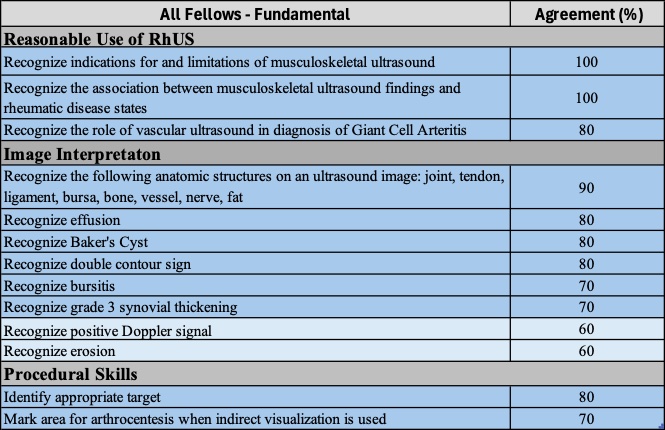Session Information
Session Type: Poster Session C
Session Time: 10:30AM-12:30PM
Background/Purpose: Over the past decade, point-of care ultrasound (POCUS) has expanded rapidly within fellowship training programs. There is strong interest in rheumatology ultrasound (RhUS) education among U.S. rheumatology fellowship training programs, however there is inconsistency in curricular offerings and not all programs are able to offer a formal RhUS curriculum. The 2019 American College of Rheumatology (ACR) RhUS Mini-Curriculum offers an optional, comprehensive model curriculum for educators1. However, learners vary in their interest and available time for RhUS practice. Educators face the challenge of tailoring their teaching to a broad array of learners, from those seeking only basic knowledge to those pursuing advanced mastery. This project aimed to gain expert consensus on an updated set of RhUS skills and stratify them by level to provide a structured educational framework for trainees with a range of learning goals.
Methods: An application to update the 2019 RhUS Mini-Curriculum was approved by the ACR Curriculum Subcommittee. The project was approved by the Massachusetts General Hospital Institutional Review Board. RhUS experts were invited to participate in three virtual focus group meetings. Experts had extensive RhUS teaching experience and were RhMSUS certified. All were Ultrasound School of North American Rheumatologists (USSONAR) faculty with more than 5 years of RhUS teaching experience, the majority (80%) of whom had more than 10 years of experience. The experts reviewed RhUS skills adapted from the 2019 ACR RhUS Mini-Curriculum as well as additional skills recommended by the expert panel. The modified Nominal Group Technique (NGT) was used to reach consensus on which RhUS skills to include and how to classify them by level. Participants were identified through non-probability sampling. Strong agreement was defined a priori as agreement of 70% or greater. Moderate agreement was defined a priori as agreement of 51-69%.
Results: The NGT comprised 10 experts who voted on a total of 83 RhUS skills. Thirteen RhUS skills were designated as “All Fellows–Fundamental” (11 with strong agreement, 2 with moderate agreement) (Table 1). Thirty-four skills were designated as “Ultrasonographer Fellow-Advanced” (21 with strong agreement, 13 with moderate agreement) (Table 2). Seventeen skills were designated as “Ultrasonographer-Aspirational” (13 with strong agreement, 4 with moderate agreement) (Table 3). Moderate agreement supported removal of one skill. Consensus on level was not reached for 19 skills. Additionally, there was strong consensus (90% agreement) around adding ultrasound images alongside joint scanning protocols to enhance the 2019 ACR RhUS Mini-Curriculum.
Conclusion: This study establishes expert consensus on a tiered set of RhUS skills, enhancing the 2019 ACR RhUS Mini-Curriculum by adding a practical framework to tailor rheumatology ultrasound education to varying learner needs and performance goals, enabling more scalable training in rheumatology ultrasound.References: 1. Cannella, Amy C, et al. 2019 Rheumatologic Ultrasound (RhUS) Curriculum Supplement to the American College of Rheumatology 2015 Core Curriculum Outline, American College of Rheumatology, 2019.
 Table 1. Summary of RhUS skills designated as All Fellows – Fundamental. Strong agreement was defined as agreement of 70% or greater. Moderate agreement was defined as agreement of 51-69%. Dark Blue: Strong Agreement. Light Blue: Moderate agreement.
Table 1. Summary of RhUS skills designated as All Fellows – Fundamental. Strong agreement was defined as agreement of 70% or greater. Moderate agreement was defined as agreement of 51-69%. Dark Blue: Strong Agreement. Light Blue: Moderate agreement.
.jpg) Table 2. Summary of RhUS skills designated as Ultrasonographer Fellow – Advanced. Strong agreement was defined as agreement of 70% or greater. Moderate agreement was defined as agreement of 51-69%. Tier 1 and Tier 2 views reference previously published consensus of North American rheumatologists (Bethina NK, et al 2022; Yinh J et al, 2021). Dark Blue: Strong Agreement. Light Blue: Moderate Agreement.
Table 2. Summary of RhUS skills designated as Ultrasonographer Fellow – Advanced. Strong agreement was defined as agreement of 70% or greater. Moderate agreement was defined as agreement of 51-69%. Tier 1 and Tier 2 views reference previously published consensus of North American rheumatologists (Bethina NK, et al 2022; Yinh J et al, 2021). Dark Blue: Strong Agreement. Light Blue: Moderate Agreement.
.jpg) Table 3. Summary of RhUS skills designated as Ultrasonographer Fellow – Aspirational. Strong agreement was defined as agreement of 70% or greater. Moderate agreement was defined as agreement of 51-69%. Tier 3 views reference previously published consensus of North American rheumatologists (Bethina NK, et al 2022; Yinh J et al, 2021). Dark Blue: Strong Agreement. Light Blue: Moderate Agreement.
Table 3. Summary of RhUS skills designated as Ultrasonographer Fellow – Aspirational. Strong agreement was defined as agreement of 70% or greater. Moderate agreement was defined as agreement of 51-69%. Tier 3 views reference previously published consensus of North American rheumatologists (Bethina NK, et al 2022; Yinh J et al, 2021). Dark Blue: Strong Agreement. Light Blue: Moderate Agreement.
To cite this abstract in AMA style:
Parsons C, Ma i, Cannella A, Kissin E, DeMarco P, Nishio M, Oberle E, Bakewell C, Thiele R, Reginato A, Madsen N, Samuels J, Vega-Fernandez P, Lin C, Bolster M, Kohler M. A Rheumatologic Ultrasound (RhUS) Educational Framework: Expert Consensus on RhUS Skills for Adult Rheumatology Fellows in the United States [abstract]. Arthritis Rheumatol. 2025; 77 (suppl 9). https://acrabstracts.org/abstract/a-rheumatologic-ultrasound-rhus-educational-framework-expert-consensus-on-rhus-skills-for-adult-rheumatology-fellows-in-the-united-states/. Accessed .« Back to ACR Convergence 2025
ACR Meeting Abstracts - https://acrabstracts.org/abstract/a-rheumatologic-ultrasound-rhus-educational-framework-expert-consensus-on-rhus-skills-for-adult-rheumatology-fellows-in-the-united-states/
